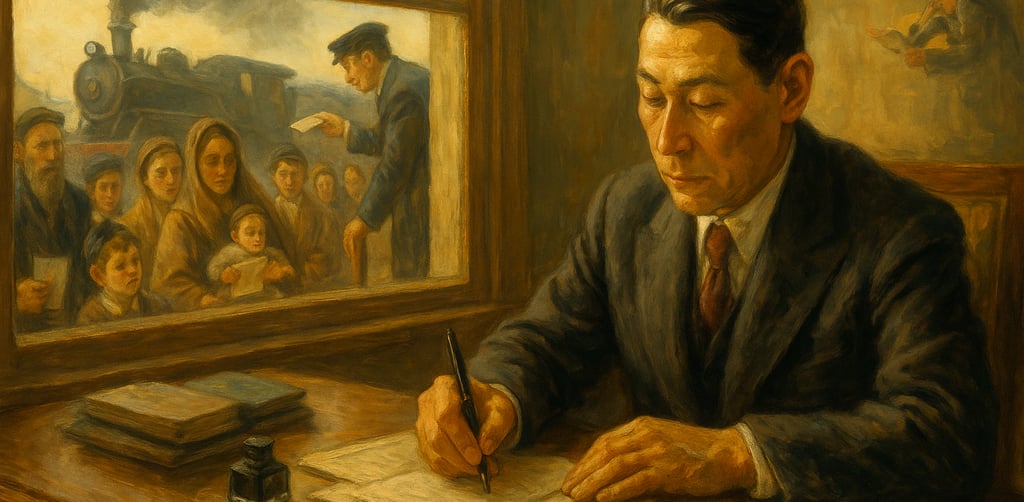The Japanese Schindler: Chiune Sugihara and the Visas for Life
Discover how Japanese diplomat Chiune Sugihara defied orders in 1940 to issue thousands of lifesaving visas to Jewish refugees. Learn how one man’s courage saved 6,000 lives.
ENGLISH THROUGH HISTORY
Adi English
4 min read


🌍 Story 3: Japan & the Jews (1940)
LEVEL 3 – Advanced
Length: ~551 words
In the summer of 1940, Lithuania was overflowing with Jewish refugees fleeing the Nazis’ persecution. Poland had already been invaded, and Europe was growing more dangerous with every passing week. The Soviet Union occupied Lithuania, and fear spread that Nazi Germany would soon take over. For Jewish families, escape routes were closing fast.
The United States and Britain had strict quotas that allowed very few Jewish refugees to enter. Most European nations had closed their borders entirely. In this hopeless situation, thousands turned to an unlikely place: the Japanese consulate in the city of Kaunas.
The consul there was Chiune Sugihara, a career diplomat from Japan. Each morning, when he arrived at his office, he found crowds of men, women, and children waiting outside, begging for help. They asked for transit visas that would allow them to travel across the Soviet Union to Japan, and from there to safer countries like the United States, Canada, or Palestine.
Sugihara sent telegrams to Tokyo three times, requesting permission to issue these visas. Each time, the response was negative. The Japanese government feared diplomatic problems, and officials argued that many refugees lacked the proper papers or money for onward travel.
Sugihara now faced a moral choice: obey his government’s orders or follow his conscience. After long discussions with his wife, he chose the latter. For nearly a month, he worked from dawn until midnight, hand-writing thousands of visas. Witnesses remembered that his hand was swollen and cramped from signing. He sometimes issued hundreds of visas in a single day. Families who had no hope suddenly held in their hands a small document that meant survival.
When the Japanese consulate was ordered to close in late August, Sugihara still refused to stop. On the train platform, as he prepared to leave Lithuania, he continued signing papers. Survivors later recalled how he threw stamped documents from the window of the departing train, desperate to save as many as possible until the last moment.
In the end, Sugihara issued around 2,000 transit visas. But because many visas covered entire families, historians estimate that his actions saved roughly 6,000 Jews from the Holocaust. Those who survived later called their documents “Visas for Life.”
After the war, Sugihara did not return to glory. On the contrary, he was dismissed from Japan’s diplomatic service. Some say it was because of his defiance, others that it was due to postwar downsizing. Either way, his story was forgotten for decades. Sugihara worked modest jobs, including selling light bulbs and later managing a small trading company.
Only in the 1960s and 1970s did survivors begin to search for him. They told the world about the Japanese consul who had risked everything to save strangers. In 1985, Israel honored him as one of the Righteous Among the Nations, the highest award for non-Jews who rescued Jews during the Holocaust. His wife and children accepted the recognition, and his legacy began to spread.
Sugihara’s story shows how one individual can resist oppression and change history. He risked his career, his reputation, and perhaps even his safety. Yet by following his conscience, he gave thousands of people a chance at life. His legacy reminds us that courage and compassion are not measured by armies or governments, but by the choices of individuals who dare to act.
Vocabulary (10 words)
Diplomat – a person representing their country abroad.
Explanation: Diplomats work in embassies or consulates and handle international relations.
Example: The diplomat worked in the embassy in Paris.
Student example: ____________
Refugee – someone forced to leave home due to danger.
Explanation: Often used for people escaping war, persecution, or disaster.
Example: The war created thousands of refugees.
Student example: ____________
Persecution – cruel or unfair treatment, especially for religion or race.
Explanation: When people are attacked, discriminated, or oppressed for who they are.
Example: The regime’s persecution forced many to flee.
Student example: ____________
Conscience – the inner sense of right and wrong.
Explanation: That “little voice inside” that tells you if something is good or bad.
Example: He followed his conscience and told the truth.
Student example: ____________
Moral choice – a decision about what is right or wrong.
Explanation: Used when people must pick between obeying rules and doing the ethical thing.
Example: She faced a moral choice about telling the truth.
Student example: ____________
Witness – someone who sees an event happen.
Explanation: Often used in courts, history, or personal accounts.
Example: The witness described the accident to police.
Student example: ____________
Dismissed – officially removed from a job.
Explanation: Means being fired or let go, often with shame.
Example: He was dismissed for breaking the rules.
Student example: ____________
Descendants – the children or later generations of a person.
Explanation: Your grandchildren, great-grandchildren, and so on.
Example: The king’s descendants still live today.
Student example: ____________
Oppression – unfair control or domination over people.
Explanation: When one group has power and uses it cruelly over another.
Example: The people rose against oppression.
Student example: ____________
Legacy – something remembered or passed down from the past.
Explanation: Can be cultural, personal, or national — what remains after someone is gone.
Example: Her legacy of kindness inspired her students.
Student example: ____________
Exercises (Level 3)
Comprehension:
What situation did Jewish refugees face in 1940?
Why did they come to Sugihara’s office?
How did Tokyo respond to Sugihara’s requests?
What did Sugihara do when he left Lithuania?
How many lives were saved because of him?
Multiple Choice:
In which city did Sugihara serve?
a) Kaunas b) Warsaw c) Tokyo d) Riga
How many times did he ask Tokyo for permission?
a) One b) Two c) Three d) Four
What award did Israel give him?
a) Nobel Prize b) Righteous Among the Nations
c) Medal of Honor d) Ambassador of Peace
When did survivors begin to share his story widely?
a) During the war b) Right after the war c) Decades later d) Never
Why was Sugihara dismissed from service?
a) He was too old b) He disobeyed orders
c) He retired voluntarily d) He moved to Israel
Fill in the Blank:
Sugihara was a Japanese _______.
Jewish families were victims of _______.
He followed his _______ instead of orders.
Survivors and their _______ remembered him later.
His actions left a lasting _______.
True/False:
Sugihara’s government told him to give visas freely.
Sugihara and his wife worked day and night.
He gave out around 6,000 visas.
After the war, he was celebrated in Japan.
Israel honored him in 1985.
Discussion:
Why is Sugihara called the “Japanese Schindler”?
Do you think disobeying orders can be the right thing to do? Why?
How does this story show the power of individual action?
Why might Japan have dismissed him instead of praising him?
What lessons from Sugihara’s legacy apply to today’s refugee crises?
